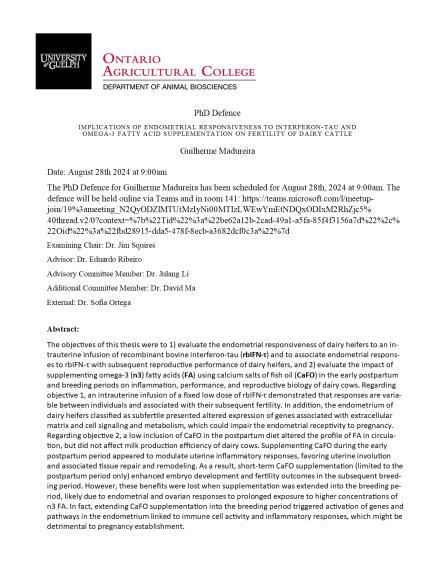Guilherme Madureira's PhD Defence
Date and Time
Location
Room 141 and Teams: https://teams.microsoft.com/l/meetup-join/19%3ameeting_N2QyODZlMTUtMzIyNi00MTIzLWEwYmEtNDQxODIxM2RhZjc5%40thread.v2/0?context=%7b%22Tid%22%3a%22be62a12b-2cad-49a1-a5fa-85f4f3156a7d%22%2c%22Oid%22%3a%22fbd28915-dda5-478f-8ecb-a3682dcf0c3a%22%7d

Details
IMPLICATIONS OF ENDOMETRIAL RESPONSIVENESS TO INTERFERON-TAU AND OMEGA-3 FATTY ACID SUPPLEMENTATION ON FERTILITY OF DAIRY CATTLE
The objectives of this thesis were to 1) evaluate the endometrial responsiveness of dairy heifers to an in-trauterine infusion of recombinant bovine interferon-tau (rbIFN-τ) and to associate endometrial respons-es to rbIFN-τ with subsequent reproductive performance of dairy heifers, and 2) evaluate the impact of supplementing omega-3 (n3) fatty acids (FA) using calcium salts of fish oil (CaFO) in the early postpartum and breeding periods on inflammation, performance, and reproductive biology of dairy cows. Regarding objective 1, an intrauterine infusion of a fixed low dose of rbIFN-τ demonstrated that responses are varia-ble between individuals and associated with their subsequent fertility. In addition, the endometrium of dairy heifers classified as subfertile presented altered expression of genes associated with extracellular matrix and cell signaling and metabolism, which could impair the endometrial receptivity to pregnancy. Regarding objective 2, a low inclusion of CaFO in the postpartum diet altered the profile of FA in circula-tion, but did not affect milk production efficiency of dairy cows. Supplementing CaFO during the early postpartum period appeared to modulate uterine inflammatory responses, favoring uterine involution and associated tissue repair and remodeling. As a result, short-term CaFO supplementation (limited to the postpartum period only) enhanced embryo development and fertility outcomes in the subsequent breed-ing period. However, these benefits were lost when supplementation was extended into the breeding pe-riod, likely due to endometrial and ovarian responses to prolonged exposure to higher concentrations of n3 FA. In fact, extending CaFO supplementation into the breeding period triggered activation of genes and pathways in the endometrium linked to immune cell activity and inflammatory responses, which might be detrimental to pregnancy establishment.